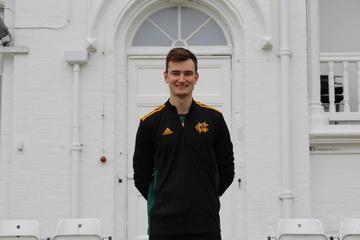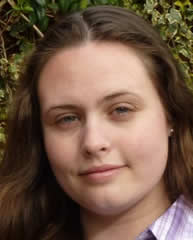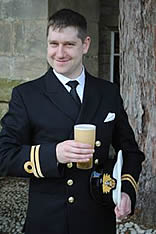Alumni Profiles
Below is a small selection of alumni profiles, showing the range of professions open to those with undergraduate or graduate degrees in Classics from Oxford.
Toby Pettman, Classics Course 1A, Jesus College 2016; now a cricketer.

Having read Classics at Jesus College from 2016-2020, I surprised even myself when I embarked upon a career as a cricketer after sitting my finals during the Coronavirus pandemic. I never imagined that an Oxford Classics degree would lead me to signing my first professional contract with Nottinghamshire CCC.
I had a fantastic experience at Oxford, as I was able to balance playing sport to a high level with rigorous academic study. I played for the Blues and MCCU teams for all four years of the course, which opened the door to a trial at Nottinghamshire. On the academic side, I especially enjoyed history, focusing my studies on authors like Herodotus, Polybius and Cicero. I was fortunate to have several sport-loving tutors who helped me understand matters such as Roman history in the 4th century by analogy to test cricket.
I hope my experience shows that an Oxford Classics degree can open doors to any career path imaginable. I will cherish the opportunities I had to learn with leading experts in a variety of Classical disciplines in lectures and tutorials. However, I am just as grateful that I was able to make the most of fantastic extra-curricular opportunities Oxford offers too. Life as a cricketer is very different to that of Classics at Oxford, but I am fortunate to know that the skills of analysis, argument and criticism which I learnt during my degree will serve me well when I retire from cricket. In the meantime, I keep my classical knowledge ticking over by doing the Times Latin crossword while we bat!
Nico Hobhouse, Trinity College 2015; now a teacher in China.

I studied Classics at Trinity College from 2011-2015. The parts of my degree that I most enjoyed were philosophy and Greek literature. Since graduating my job has been to teach an eclectic range of introductory courses to Western literature at a university in southwest China. Euripides’ Medea, I can vouch, evokes just the same combination of sympathy and revulsion in a classroom in Chongqing as she did in my tutorials in Durham Quad. I have spent much of the rest of my time practising Buddhism in eastern Tibet. It turns out that the skills required to unpick the essential meanings of Buddhist teachings expressed in the terms of Tibetan culture are the very same ones I was taught when studying Plato, namely a sensitivity to language, to symbolism, to the historical context in which the texts were written, and to unexpressed philosophical assumptions in the arguments. Classics, in short, has opened some surprising doors.
Joshua Baldwin, graduated 2013; now a Lead Game Designer.

I'm Joshua Baldwin and I'm Lead Designer at Coldwood Interactive, a video game studio in northern Sweden. While I've been working on the artistic puzzle-platformer Unravel Two for the last few years, I actually got my first job at a historical games studio - Creative Assembly. My knowledge of history and art obviously came in handy, but it was the skills I learned during my CAAH degree that really prepared for life in the games industry. All games are based on systems - they are interlocking sets of rules the player can interact with. For me, this has direct parallels in archaeology and anthropology, where you take a disparate set of pieces of evidence and try and create wider rules that explain how societies worked and people behaved. It's the human element that's really key to both - a set of rules by itself is useless if it doesn't replicate behaviour that makes sense to the historian or player. So don't let yourself be limited by your subject matter! Your skillset unlocks a whole swathe of jobs based around systems and not just in the videogame industry.
Liliana Worth, graduated 2010; now works for CNC.
I chose to do a Joint Schools degree in Classics and French as I was interested in Europe, its languages, and its classical heritage. Moreover, the breadth of the degree was very attractive: I found I could study La Nausée alongside numismatics, debate Sarkozy’s election while reading Epicurus, and compare Catullus with Flaubert. Such broad training meant I was a good position to pursue interdisciplinary research, first through an MSt in Medieval Studies and then a DPhil in English Literature (to 1550). Throughout my graduate research I often found myself drawing on my previous knowledge and skills, especially with regard to untranslated texts and reworkings of classical material. Plus, the range of subjects I’d studied earlier meant I was ever ready to explore new fields and languages.
And so to China, where I now work as a television presenter for programmes on Chinese society, politics and culture. It’s a far cry from 13th-century Latin histories but no less entertaining! I’ve found that the meticulous linguistic training from my degrees was first-rate preparation for tackling the puzzle of Chinese characters, while studying the classical and medieval worlds left me ready to take on the rich unfamiliarity of Chinese traditions. My earlier studies have led to all sorts of new intellectual adventures — whether reporting in Tiananmen Square on the history of the Silk Road, doing a live broadcast in Chinese while paragliding in Guizhou, interviewing world leaders at the Asian Davos, or presenting on endangered minority communities in Sichuan. Studying the European past gave me, paradoxically, the right tools for understanding the Chinese present.
Sometimes I wonder about integrating more Classics into our programmes and presenting on, for example, 17th-century Jesuits’ writings in Latin about contemporary China. But I’m still working on convincing my editor to do a series on that...
Dr Lucy Jackson, Corpus Christi College 2004, now Assistant Professor of Ancient Greek Literature

I first came to Oxford in 2004 as an undergraduate on the four-year Lit Hum 1A course. I have to admit I wasn't the most focused of classicists during the first three years; rowing, theatre, the college ball committee - all offered pleasant distractions and possibilities. Beginning the final-year dissertation showed me what I'd been missing. I knuckled down and managed to achieve a perfectly adequate final mark in Greats. After a year 'out' when I tutored alongside caring for my elderly father, I spent a very happy year at the University of Exeter completing a one-year Master's degree. I returned to Oxford for a DPhil in Classical Languages and Literature in 2010. This time I was determined not to miss a single opportunity and made the most of Oxford's superlative range of seminars, lectures, and classes. Support abounded for travel and the building of a nascent scholarly network. Through my college, Corpus, I was able to spend a term at the Scuola Normale in Pisa in 2012 and, via a different Faculty scheme, was a visiting student at Princeton University for a semester in 2013. These were precious and spectacularly generative periods of time when I broadened my perspective on matters within and beyond the academy.
After a stint as a Knowledge Exchange Fellow at The Oxford Research Centre in the Humanities in 2014, I was a teaching fellow at King's College London, then stipendiary lecturer at Balliol College Oxford. I was awarded a Leverhulme Early Career Fellowship back at King's College London (2016-19) and after that I joined the Classics and Ancient History department of Durham University as Assistant Professor of ancient Greek literature. The ways in which Oxford's ethos and resources have enabled me to move and work as I have done are inescapably obvious. But I would certainly not be where I am, whole and happy, were it not for the encouragement and kindly indulgence of the department's many excellent humans (and, occasionally, animals).
Dr Katie Low, postgraduate 2013; now works for the European Commission, Brussels.

I submitted my doctorate on Tacitus’ Annals in the summer of 2013. I very much enjoyed my time as an undergraduate and postgraduate in Oxford, but my commitment to Classics sometimes had to compete with my strong interest in modern European languages and culture. Fortunately these two passions were not mutually exclusive: thanks to a college exchange and understanding supervisors, I was able to spend a year studying in Paris, and with the help of Faculty funding I also attended conferences abroad. One of my favourite memories from my graduate career is of sitting on a Romanian mountainside one early autumn day, looking out over the Carpathians with new friends from eastern and western Europe that I had just made at one such event.
Following my viva I taught students in Oxford and elsewhere, but after a year of applying for full-time academic posts I realised I did not feel fully committed to the process; I had also heard about the internships available to graduates at the EU’s institutions. To my surprise I was offered one, and so moved to Brussels. The internship was a wonderful, horizon-broadening experience, and turned out to be an excellent foundation for an internationally-focused career (I have written more about the transition here). For the past five years I have worked at the European Commission, moving from communications – for which my academic writing background was certainly useful – to policy. Currently I am part of a team focused on the development of emerging technologies like supercomputing and quantum in Europe. It is a varied and interesting role that allows me to draw on the analytical skills I acquired during my studies. I’m very glad I came to Brussels, but I have no regrets about doing a doctorate in Classics first.
Jenny Amphaeris, St. Hilda's College 2008; now studying for a PhD in linguistics and biological sciences.

Following my Literae Humaniores undergraduate at St Hilda’s College, and some research in between, I am now undertaking an interdisciplinary Ph.D. between linguistics and biological sciences funded by Bangor University’s College of Arts and Humanities. I am reassessing definitions of language in light of developments in both cognitive science and animal communication research. The aim is to streamline terminology use and language conceptualisation across disciplines by constructing a new theoretical framework for language and determining if, and how, other species might fit into this. My Classical training at Oxford has been invaluable, not only to aid in articulacy, criticality, and confidence in asserting my ideas, but more specifically providing me with a keen grasp of philosophy, the historical perspective on language, and the challenge set by ancient sages to think beyond the limits of current understanding.
Roberta Thomson, St. Hilda's 2004; now Director of Corporate Communications, Facebook.
https://www.youtube-nocookie.com/embed/07wVREqhQ1Y?rel=0Douglas Reith, Christ Church 1989; now an actor.

Mods 'A' Literae Humaniores at 36 years old! Daunted? No;apprehensive? You bet! There I was, a Christ Church 'Fresher' in October 1989,exactly twice the age of the other new bugs. I'd re-sat my Latin and Greek 'A'levels, in order to be at least on a par with all the bright and younger things. My initial worries were groundless.
The House is a wonderfully inclusive college, and I was never made to feel out of place by any of my much younger comtemporaries. The course tested and stretched me to the limit -sometimes beyond! But I always had the support of wonderful tutors -and fellow students brighter than I. I had resigned from my announcing job with BBC Radio 3 to return to classics, and I haven't regretted that decision for a second; it was a fantastically enriching 4 Years. I went on to teach at a VIth Form college in London, then briefly at Westminster School, and as a private tutor, until I revived my acting career. I have no doubt that my reading of Greek Tragedy and Comedy has informed and deepened my understanding of performance - even in my present role in Downton Abbey! Looking back now, what a privilege it was to have the time and freedom to study some of the greatest literature ever written, and be guided by some of the finest minds available.
Marina Kemp, Christ Church 2004; now a novelist.

I studied Classics at Christ Church from 2004-2010. I enjoyed the course from the beginning, but it was after the second-year exams, when I could focus exclusively on literature and ancient history, that I really began to love it. As a degree, I think Oxford’s Classics course is incomparable in its sheer range. I particularly loved studying Homer and Classical Reception (the reception of ancient texts into 20th-century literature). But I genuinely miss all of it: the forensic approach you have to take when studying ancient history, given the often patchy or incomplete nature of the sources; the rigour of the language work and translation; the passion of the brilliant tutors; and, most of all, the beautiful and immensely powerful literature, which often felt incredibly modern to me.
It’s definitely that literary training that has stayed with and informed me in my career. I worked for some time at Penguin Random House, in Editorial, before co-founding Ink Academy, which provides editorial guidance and creative writing teaching to aspiring writers (many of whom have now been published). But the main focus of my time is my own writing. My first novel, Nightingale, was published in the UK and the US in 2020, and shortlisted for the Sunday Times Young Writer of the Year and the Southbank Show Times Breakthrough Artist of the Year Awards.
I am now halfway through writing my second novel, and find myself drawing on my Classics degree often. It inspired both creativity and discipline in me, both of which are crucial to work as a novelist.
Lorna Averies, Classics course II, Trinity College 2014; worked in Communications, now studying Medicine.

The course (IIA) was everything I had hoped in furthering my interest in Classics - with exceptional resources, teaching, and opportunities. Yet, what I found most valuable about my education in Classics was the wide range of skills it gave me, in addition to building my confidence. The four years I spent reading, translating, and analysing texts were an excellent grounding for my first several jobs working in Communications. The language skills and confidence developed during my degree enabled me to lead my own team and create the first communication review board for a major bank. I am now studying Medicine where I have found the communication, language, and critical thinking strengths gained through Classics have been essential. Having a well-rounded education and background has allowed me to adapt my skills to a range of careers and situations, and I find it difficult to imagine any career where they would not be directly useful.
Dr Kelly Shannon, postgraduate 2012; now Assistant Professor of Classics at the University of Alabama.

After graduating with a BA in Classics from the University of Virginia, I came to Oxford for the MSt, intending to leave after the year was up to return to the US to enter a PhD program. One term in Oxford changed my mind completely. By the end of Michaelmas, after hitting upon my ideal topic and supervisor for a DPhil thesis, I had my heart set on staying in Oxford for the rest of my postgraduate education, made possible by generous financial support from the Clarendon Fund and the Memoria Romana Project. My goal had always been an academic position in an American university, so I am happy to report (writing nearly ten years after that first Michaelmas Term!) that I now work as Assistant Professor of Classics at the University of Alabama. My path to the tenure-track took me through two one-year positions along the way (a postdoc in Germany and an adjunct-lecturer position in the US).
The excellent training I received in the Faculty of Classics has helped me achieve these goals. Oxford offered me unique resources and opportunities – particularly its lively seminars, excellent research libraries, and special collections that allow postgraduate students to learn skills like papyrology and palaeography directly from ancient documents and medieval manuscripts – that made me a better Classicist in ways that I still feel daily. In my intermediate Latin classes at Alabama, I still use handouts I created when I taught MILC Latin classes back in 2008-9. I am getting to redeploy my Greek palaeographical skills to produce a textual edition of the Greek paradoxographer Phlegon of Tralles that is one of my current works-in-progress. Even my dear old DPhil thesis has life in it yet – a revised version will be published soon in the Oxford Classical Monographs series. Oxford’s people are perhaps the most impressive of its many resources, and I am still in regular contact with my supervisor and other members of the Faculty, and with many of the friends I made while writing my DPhil, who are now colleagues in departments scattered across the globe.
Ben Lay, postgraduate 2008; now a Lieutenant in the Royal Navy.

After studying Classics from 2003 to 2007, I took the MSt in 2007/8. I enjoyed the opportunity to run to greater depth on a single topic in the form of the dissertation, to broaden the range of my studies (I took the Horace paper that I had been unable to fit in alongside my other Finals options), and to undertake more specialised and focused study (in my case the Greek and Latin Metre papers). Following a period of varied work in and around the University, I applied to join the Royal Navy in 2011 and began training as a Logistics Officer in 2013. I have since been promoted to the rank of Lieutenant, been deployed to the Mediterranean, Middle East, and UK waters, and am now serving in the Carrier Strike Group, expecting to join the hydrographic vessel HMS Scott next year as Head of the Logistics Department.
Besides the immediately appreciable advantages of additional seniority conferred by holding a MSt upon entry and being years ahead of those trying to obtain equivalent in-Service degrees, the foundations of Classical study have proved invaluable in other ways. The high-level training in the arts of pure and applied thinking are readily transferrable to every aspect of military planning, operations, and support, and an ordered, analytical approach has helped at every stage of training. My daily work also depends a great deal upon writing, analysing, and “staffing” documents. What comes as second nature to a Classicist, such as drawing the critical facts immediately from the text in front of us (and from the ones we cannot see but have to deduce), impresses the Command, just as the countless historical parallels or even a translated ship’s motto does for any of my shipmates. I hope to apply soon for legal training within the Royal Navy, where again I know that the Oxford MSt will be considered favourably.
Daisy Dunn, St Hilda's 2005; now a writer.

I came up to Oxford to read Classics armed with a Latin dictionary, a box of empty ring-binders, and a pink kettle. When I went down in 2009, I had twelve over-filled files, stacks of student newspapers I couldn’t throw away,and, resting on top, the ‘soft cap’ I chose in preference to the mortar board for taking to the university examinations. Seeing my accomplishments piled up like that only blurred the memories of what life had been like as an undergraduate.
There was no room in the car boot for the hours I had spent tracking down articles in the Sackler Library, or listening to lectures on the Homeric Question in Schools, or handling priceless Greek vases and Roman casts, and editing copy in the frantic newspaper offices on St Aldate’s. I studied both Greek and Latin as part of the course, and really enjoyed the opportunity to take papers in Homer and Ovid, as well as in Roman history, art, and the Reception of Classics in twenty-first century poetry. By the end of the final year I wanted to look at the subject from a different perspective, and won a scholarship to study for an MA in Art History of Renaissance Italy at the Courtauld Institute in London. After a break, this led me to embark upon a part-time PhD in the relationship between the two worlds, the ancient and the Renaissance, at UCL, where I was lucky enough to be awarded funding from the AHRC. At the same time I worked as Executive Officer of JACT, which supports the teaching of Classics in schools,and as a journalist. I completed my PhD in 2013. Today I work full time as a writer and critic, and remain involved in the work of JACT and the Classical Association. My first book is very much inspired by the topics I studied as a Classics undergraduate at Oxford.
Joanna Dirmikis, Magdalen College 1997; now a qualified barrister.

My passion for Greece, drama and history drew me to studying Classics. Oxford was an obvious choice because it has the best reputation in the subject and Magdalen was the obvious college for me because of having Professor Oliver Taplin, a world expert in Ancient Greek theatre. I have very fond memories of the tutorial system at Oxford and the theatrical performances I acted in and directed whilst I was a student at Oxford.
Studying Classics helped me hone some of the skills I still use today for my work as a barrister -forensic analysis of huge amounts of information, honing arguments on one side or another, interpreting and weighing evidence and asking and trying to answer some very challenging questions. But it also gave me a bedrock of knowledge which I can always go back to and build on if I want to. I am still fascinated by the Ancient World, still love all things Classical and I am so glad I decided to study what I did. It has made me a better lawyer and hopefully a more interesting and well-rounded person !



